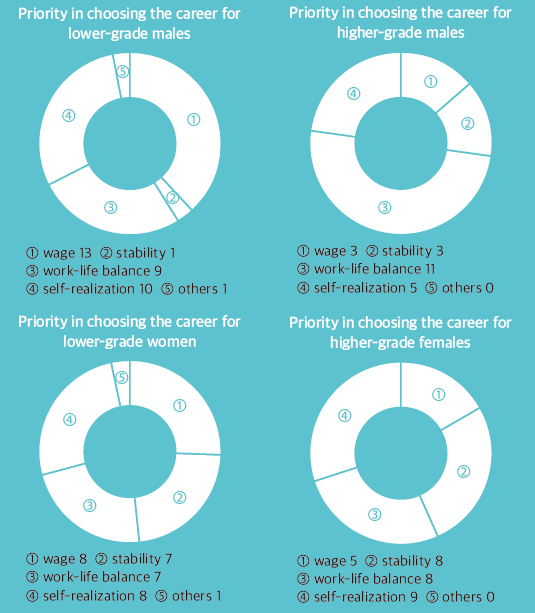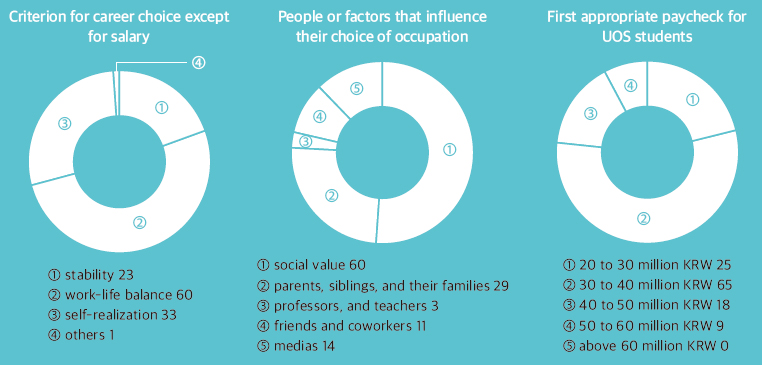
A man was heading for the library, even though it was Korea’s New Year national holiday, Seollal. He was planning to study for a computer utilization exam, to study accounting, and to read books during the holiday. He said “I should manage my time well during the vacation, because during the semester I do not have much time for preparing to get a job.” He added, “In January, I spent a lot of time for appointments and met many people. Now, I should also prepare for next semester.” After we briefly interviewed, he headed for the library in a hurry. Does this story sound unusual? Actually, on February 4, despite many people enjoying the national holiday, the Korea Chamber of Commerce and Industry, which was one of the exam places, was crowded with examinees taking a computer utilization examination. Also, we could watch the news talk about how job seekers study very hard for getting a job during the holiday.
Annually, the media of South Korea reports survey data about which future jobs youths would like. The results of the survey show the social aspects of Korea. There has been a firm preference for some jobs, such as a teacher or doctor. According to survey data of the Ministry of Education, Broadcasting Jockey (BJ) is ranked sixth among jobs which elementary students chose. A person’s job is considered most important to all age groups because your job is not only a means of self-realization but also your source of income.
Nowadays, a job as a means for income generation is thought very important. Korean parents devote themselves for the education of their children. Also, reflecting on the fact that the size of Korea’s private education market is about 17 trillion KRW, many Korean students depend on private education for their academic accomplishment. Recently the Korean drama, Sky Castle, dealt with Korea’s fierce enthusiasm for education, parental intensity for their children’s college entrance examination, and their future jobs. Many Koreans sympathize with this drama and it made the headline for the education policy of Korea’s government. This raises the question, what job seeking environment are Korean university students encountering?
After the International Monetary Fund (IMF) currency crisis broke out in 1997, the Korean government announced unemployment countermeasures, regardless of the ruling party. Although the countermeasures have had some effect, unemployment has been one of the most important issues in Korea. Since Korea became a developed country, the growth rate of the economy has decreased annually and the creation of new jobs has weakened. In particular, the youth unemployment problem is getting worse. The Ministry of Economy and Finance (MOEF) foresee that the youth unemployment problem will persist for at least the next three years, due of demographic factors. MOEF say the main cause to this problem is that the number of people from the Echo-generation seeking jobs is more than that of the prior generation. As a result, employment becomes more competitive, as more and more young job seekers enter into the job market which shows a decline in making new jobs. In reality, university students attempting to become working members of society feel the unemployment problem most vividly. According to the Korean Educational Development Institute, the employment rate of undergraduates of the top 10 universities in Korea (including UOS) has continuously been lower than 70 percent. Lately, as industries are being restructured, that rate was 67.1 percent in 2017, which is lower than the rate of 69.2 percent in 2014. So then, what do UOS students think about job-seeking and career choices?

The UOS Times surveyed students of UOS on which elements are most important when they are seeking jobs in this fierce environment. We also inquired about who is influencing them the most when they choose their future career.
Based on a survey of UOS students’ career choices, The UOS Times looked at what criteria they were considering when it came to choosing their future careers. As for the students’ personal information, the most basic questions were their gender and grade/year of study (1st and 2nd year students are referred to as lower-grade students, and 3rd and 4th year students are referred to as higher-grade or seniors), as they may have views when they think about looking for a job.
The first question was, “What is your top priority in choosing the career that you are considering?” These answers include “wage,” “stability,” “work-life balance,” “self-realization” and “others.” As you can see from the table, lower-grade males chose salary as the top priority, and both “self-realization” and “work-life balance” in a similar proportion. Surprisingly, professional stability was not taken into account. There are many guesses about this, such as not knowing the importance of job security or just wanting to make a lot of money in the short term even if the job is not stable. What is certain is that males in the lower grades do not take the job’s stability seriously.
The lower-grade females chose four options at a nearly equal rate (except for “others”). Although “wage” and “self-realization” were chosen at a slightly higher rate, they were not high enough to have a significant difference from other options. However, compared to the lower-grade male’s choice, there is a notable difference. Lower-grade females chose job security at a much higher rate than lower-grade males. It needs to be approached socially and structurally. Conventional wisdom has it that if a woman marries or becomes pregnant, she may worry whether she can keep her job or not. This anxiety is still prevalent in society and many students are aware of it. Therefore, it may be the result of this social phenomenon that females considered job security as more important than males did.
The responses of higher-grade students had a slightly different survey result than lower grade students. First, a half of higher-grade males made a priority of “work-life balance,” compared that only one-fourth of lower grade students chose it as a best value. In addition, the “wage” ratio is noticeably lower. The “stability of the job” is still a small percentage. This may be the result of a desire for a healthy life style, regardless of the salary. Also, older students may have taken more practical considerations because they know more specifically what life is like in a company.
Higher grade females, like lower grade females, do not have one option noticeably larger or smaller than the others. However, “wage” was the smallest proportion, like senior males. This shows that the higher the grade, the less consideration to pay is given. Also, it can be seen that senior females still consider “stability of the job” as important as senior males did.
An analysis of the first question showed that “salary” was not as big a consideration as The UOS Times had expected. When they asked themselves how much they thought was appropriate for their starting salary, the students wanted between 30 million and 40 million KRW per annum. Also, the next highest proportion of options was from 20 to 30 million KRW per annum. This means students are concerned about their salary range and have high, but not completely unrealistic, expectations.
Then, they asked UOS students what was the most important criterion for career choice except for salary. As the graph shows, the “balance of work and life” was the most popular choice. This means that many students desire a healthy balance between working time and leisure and free time. Also, “self-realization” was the next most popular choice.
In a survey of the people or factors that influence their choice of occupation, the students chose “social value” in an overwhelming proportion. They thought that jobs that make them realize their values should include a good “work-life balance” or “self-realization.” “Parents, siblings, and their families” were chosen as the next biggest influence, which was said to have had a greater influence until just a few years ago. This means that job seekers consider their own values higher than another people’s expectation of them.
The survey results and conventional wisdom are different. Some of the survey results reflect social norms. UOS students chose “work-life balance” and “job security” at a high rate. This means they think jobs alone cannot lead to a happy life. They tend to believe that there is more to life than just working, and that there should be non-working time for self-realization and the “life” aspect of work-life balance. In other words, UOS students put their happiness first. However, they also seem to be a little stuck in the perception that jobs are just a means of sustaining a living. It is in this context that the word “work-life balance” is in vogue.

We know the right words against social conventional wisdom; they are “Let us choose a job that I can be happy about.” Jobs such as lawyers, doctors, or corporate employees are usually known for making a lot of money. However, they are not typically known as happy jobs. After the survey, interviews were conducted to learn more about UOS students’ thoughts.
The purpose of the previous survey was to examine UOS students’ values when choosing their career. To clarify the survey, we interviewed three students, each from a different field; the field of commerce and economy from a student majoring in Business Administration (Student A); science and engineering from a student majoring in Chemical Engineering (Student B); and art from a student majoring in Music (Student C). Although the interview was conducted with students from different majors, I hope readers can consider the differences in values between individuals rather than their field or major when you read the article.
First of all, the same as with the survey, we asked what factors they prioritize for their career/job selection among wage, stability, work and life balance, self-actualization (aptitude) and the reason why. Student A and Student B chose work-life balance as the first factor, while Student C ranked self-actualization as their first choice and work-life balance as their second. They thought this because the culture of strong work intensity and nighttime work in Korea is not going to be compatible with their life expectations. Work-life balance is also important to have their own time in addition to working hours to ensure a good quality of life. All three students’ value both “working time” and “non-working time” and stress the need for balance between them. The results of the UOS student survey also showed a high priority and value for work-life balance. Furthermore, ahead of the first half of 2019, a recruitment website, Incruit, conducted a survey of 1,574 job seekers on their criteria for job choice. The annual salary, including a satisfactory salary and compensation system, came first with a total of 19 percent, followed by work-life balance by a narrow margin of 16 percent. This survey shows that students at our school tend to value work-life balance over salary, unlike the indicators outside of UOS.
Aptitude ranked first place for Student C, second place for Student A and third place for Student B. Student C, an art field student, said that it is important for people to be emotionally happy and rewarded when they work, so they can get an impetus from those feelings and they can continue to work hard when the job is challenging and tiring. Student A valued aptitude because he wanted to do something that can contribute to society with the professionalism he developed when learning his major. He shared his opinion, “I had the opportunity to learn my major in business administration and found what I want to do and what I can do well. I think when I do something that I can do well, it is easier to match my aptitude and achieve self-realization.” Unlike student A and student C, Student B seemed to put more weight on factors other than aptitude. She said, “In the case of aptitude, it is a long-term problem that can be found after getting an education at a company. In addition, aptitude is not my major considerations for choosing a career because the number of companies with job rotation systems is increasing.”
Students’ thoughts of job stability were a talking point of the interview. All three students were not bounded heavily by the factor of job stability, sensing the rapid change of society. Students seemed to think that their first job would not be a lifelong job. The workforce needs to keep up with the rapid trend of the times so every job requires more ability and flexibility of people. Furthermore, student A said, “We should prepare for the transition of our career naturally and develop our skills to meet the trend of a fast society.” Rapid change, referred to by student A, is the change that takes place because of the Fourth Industrial Revolution. The Fourth Industrial Revolution refers to innovative technologies such as the Internet of Things (IoT), robotics, virtual reality (VR) and artificial intelligence (AI). These technologies change the way we live and work. Moreover, it could change all areas of the economy and society. Students already know that they need to develop themselves in advance and adapt themselves to future job environments. Since innovative technology is going to change the composition of their jobs, they gave little weight to job stability.?
When asked what kind of person or factor has the biggest impact on their career choice, student C said that his own experiences and the concerns about the career he had had the biggest impact. Student A and student B said they were influenced by their parents in a positive way. Student B said she was influenced by her parents who said, “Be a person who helps the world like light and salt.” The student of the line of commerce, Student A, was influenced by their parents who wanted him to concentrate on not only his work but also on himself.

Although everyone’s thought of job selection is different, they are also similar in that we all pursue happiness. There is no right or wrong in the criteria of job selection, since we all have different standards and perceptions of happiness. In addition to the criteria mentioned in the survey, (stability, self-realization, salary, and work-life balance) The UOS Times hope that UOS students find jobs that fully suit their needs, which may even include criteria such as job prospects, honor, power, and so on.
There are many standards we think important when we seek jobs. Although people have different opinions, there is also a firm principle that we can all consent. That is, we want to be happy and a person’s job can strongly influence their happiness. The determining factor to happiness is not the job itself, but what one thinks about that job, just as Dale Carnegie said in his book, How to Stop Worring and Start Living, “It is not what you have, or who you are, or where you are, or what you are doing that makes you happy or unhappy. It is what you think about it.”
Many people say that the new era of Industry 4.0 will change job seeking and the labor environment. Many jobs will be replaced by robots and artificial intelligence. Ma Yun, Chief Executive Officer of Alibaba Group said, “I am so thankful to recent changes surrounding me. When others complain about their environment, that time is an opportunity to you. We can respond when the world changes.”
Back to the man we saw going to the library. After he had completed his study for the day, he headed for his house. Although he looked somewhat tired, his expression was hopeful. He said, “I am finding the meaning of every day. I am going toward my goal slowly. I trust that I am doing my best and I will continue to do my best.”

Kim Jin-woo
kjw1004i@uos.ac.kr
Kim Ji-young
zzero9999@naver.com
Park Hyung-min
dmm789456@uos.ac.kr

